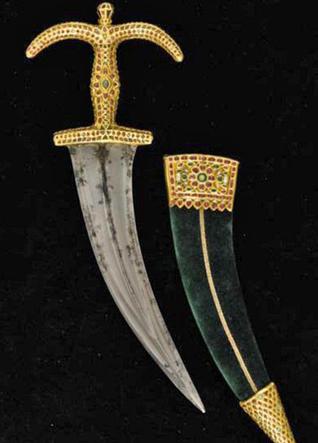 London, Oct 3: Weapons, rare paintings, pottery as well as jewelled treasures that once belonged to Tipu Sultan, Deccan kingdoms, the Mughals and among other royals are included in Sotheby's first-ever auction of Imperial India here on October 9.
London, Oct 3: Weapons, rare paintings, pottery as well as jewelled treasures that once belonged to Tipu Sultan, Deccan kingdoms, the Mughals and among other royals are included in Sotheby's first-ever auction of Imperial India here on October 9.
"Art of Imperial India," an auction comprising 90 objects encompassing almost 500 years of every kind of decorative art produced in the region.
"The sale will include works of museum quality, rarity and beauty spanning five centuries. With this diversity we have already attracted a great deal of international interest," Benedict Carter, Director, Head of Auction Sales Middle East said in a statement.
Among the auction highlights are eleven works relating to Tipu Sultan, 'Tiger of Mysore' (1750–1799).
The sword fitted with a captured English blade, taken as booty during the storming of the fortress of Seringapatam by the British in May 1799 and decorated with Tipu's personal emblem, the 'bubri', or tiger-stripe motif, has been estimated to fetch between 80,000-120,000 pounds.
An 18th century diamond-set and enamelled gold tray and casket (pandan) is expected to go under the hammer and fetch an estimated 200,000 – 300,000 pounds.
A further highlight is an 11-bore silver-mounted flintlock duck gun from the personal armoury of Tipu Sultan, signed Sayyid Ma'sum, Patam, dated Mawludi year 1218 (1789-90), has an estimated auction price ranging between 80,000-100,000 pounds.
A gem-set gold dagger and scabbard, Mughal, circa 1700, has been estimated to fetch between 80,000-120,000 pounds.
A monumental Pahari style painting depicting an enthroned Rama and Sita circa 1830-40, has been estimated to fetch between 100,000-150,000 pounds.
"The Rich Man and Lazarus" an early 17th century Mughal drawing after an engraving by Jan Sadeler of Jacopo Bassan's painting Indian, has been estimated to fetch between 10,000-15,000 pounds.
A portrait of a nobleman with a dog, attributable to a follower of well-known Perso-Mughal-Deccani artist Farrukh Beg, possibly Muhammad Ali, Mughal, early 17th century has been estimated to fetch between 60,000-80,000 pounds.
The composition of a princely youth standing or seated in front of blossoming trees was a popular one in Persian and Mughal painting of this period.
Sotheby had previously conducted sales of Indian Art in April and May 2011 which fetched the auctioneers record sales of Stuart Cary Welch's collection.






Comments
Add new comment